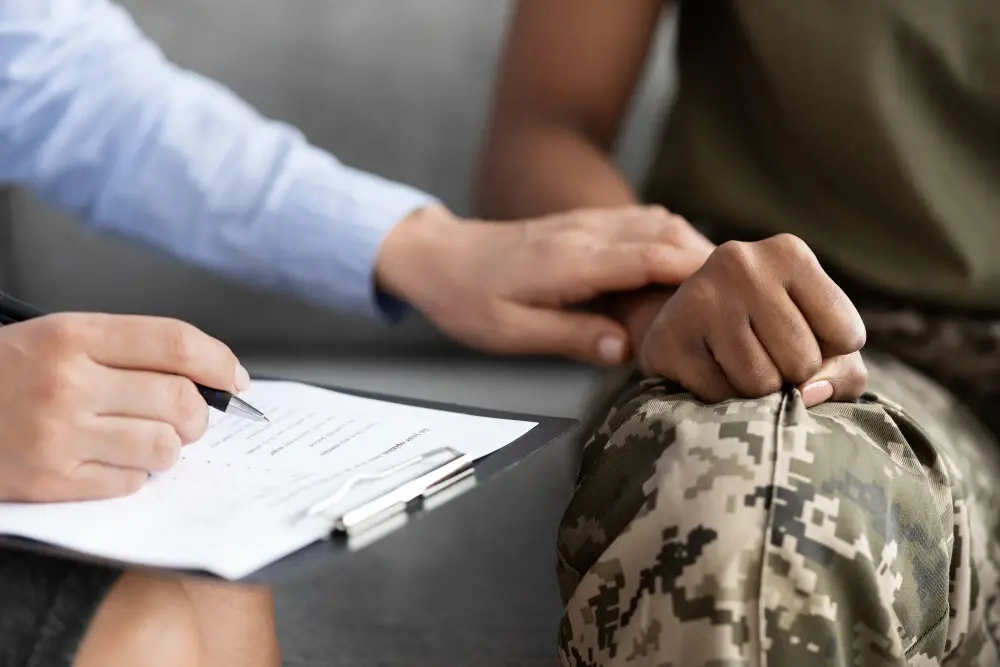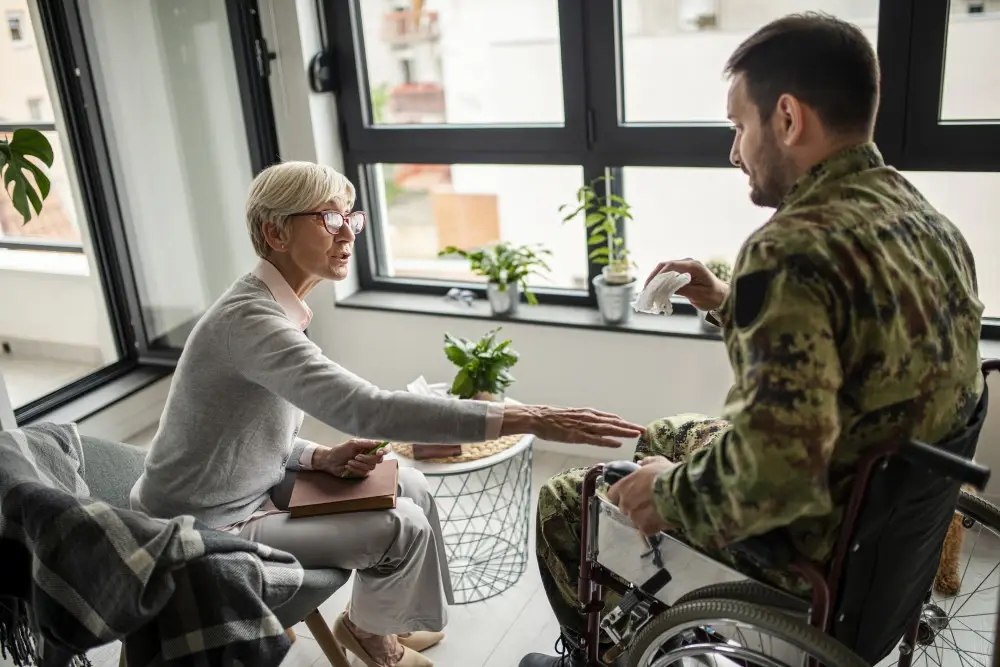A C&P exam, also called a compensation and pension exam, is a medical evaluation meant to examine your veterans disability. The C&P exam measures your level of disability and whether it’s connected to your time in service.
The Department of Veterans Affairs (VA) uses the C&P exam to determine how much compensation you need for your injuries. They are in charge of your VA claim’s decision process in receiving disability and pension benefits.
For more direct assistance, it’s best to hire a veterans disability lawyer who can analyze your case and determine the next best steps.
If you’re forced to perform a C&P exam and you don’t know what to do, here’s a guide that goes over what you should expect.
Free Veterans' Disability Evaluation
Need help securing VA disability benefits? Click here to speak with a nearby attorney for FREE about your Veterans' Disability claim.
or call (888)-927-3080
Who is Scheduled for a C&P Exam?
A C&P exam may be scheduled to gather additional information about your condition, and usually, it’s required for you to attend. The VA may contact you through phone or mail asking for you to schedule a C&P exam.
Note that you can’t start the scheduling process for claim exams yourself. Your local VA medical center will contact you and schedule your C&P appointment.
Ensure the VA has your current address, phone number, and email. You should call and confirm your appointment to not miss the date and location.
What Happens if I Cannot Attend My C&P Exam?
In cases where you cannot attend your C&P exam, it can affect your VA claim and delay the claims process. If the time and day doesn’t work for you, try to reschedule 48 hours in advance.
Unless it’s an emergency, it’s better not to reschedule the day before your exam as that would delay your claim longer.
You shouldn’t miss a C&P exam, but if you choose not to show up, this will affect your VA claim to being rated as-is. This means your claim may be determined based on potentially incomplete evidence from your application, affecting your chances to qualify.
Some VA medical centers try to accommodate your request to reschedule if you have a good reason and give enough notice.
How to Prepare For a C&P Exam
The C&P exam may determine your eligibility for VA benefits, so preparing for your appointment is essential. Your exam results itself don’t determine your eligibility, but they may be a key form of evidence for your VA claim.
C&P exams differ per case and depend on the information needed. The exam may range as short as 15 minutes to an hour on average, or more if necessary.
Once the C&P examination is over, ask for a copy of your C&P report as soon as it’s finished. It’s better to retain a copy from the VA to ensure the information is accurate and fair.
To receive the C&P report, fill out a Freedom of Information Act or Privacy Act Request (VA Form 20-10206). You may submit the form by mail or in-person at your nearest VA office.
1. Write Down Your Symptoms and Document Your Disability

Think about how it started, the pain levels, the frequency, and whether the injury has worsened. Focus on how it affected your quality of life and work. Give vivid details of your disability and never downplay your condition.
2. Wear Comfortable Clothing and Be Yourself

The exam may require you to do some physical activity, so wearing comfortable clothing is essential. Do each exercise to the best of your ability in order for your examiner to accurately rate your injury.
3. Describe Your Bad Days with Your Disability

Be precise with your examiner and explain your experiences when your disability is at its worst. Properly explaining the range of your symptoms can give the examiner and the VA a clear idea of your condition.
4. Be Respectful and On-Time

Try to arrive at your C&P exam appointment early and be respectful to the examiner as that can benefit your case. Although it’s understandable for your mood to be affected by your injury, nothing can be gained from disrespecting the examiner.
5. Be Honest with Your Injury

The physician is experienced in discerning what’s true behind your injury, so staying honest and forthright is key. Lying will only negatively affect your C&P report; the examiner will write it down for the VA to see.
6. Speak with Facts

Answer questions you’ve been asked, and keep them concise and to the point. You have a time limit, so it’s better not to waste time and ensure you’re giving the examiner factual information. Avoid arguing about your VA claim as your examiner doesn’t decide your claim’s outcome; the VA decides your claim.
7. Have a Trusted Family Member or Friend Come with You

Having a third party in the mix can help explain your injury since it can be painful or uncomfortable. You should bring someone who already knows your symptoms and you are comfortable telling them private information.
Is a Second C&P Exam a Good Sign?
If the VA asks for a second C&P exam, don’t be shocked. A second exam is normal and a sign that the VA is diligent with your claim and wants more information. You may take it as a good sign to prove your disability, which may lead to a favorable decision.
It may be frustrating going to a second examination, however, you can see this as an opportunity to present more evidence of your disability. You can present further info from your private doctor to support your disability claim.
Further letters from friends, family, or people who know your well can attest to the severity of your disability. A second C&P exam is a good way to further establish evidence from sources you haven’t presented prior.
What Not to Say at a C&P Exam
You should not say things that falsify your C&P exam. Speak honestly and don’t downplay your symptoms. The examiner is trained to detect false facts and can write you down for malingering if you attempt to fake your exam.
“Any person subject to this chapter who, with the intent to avoid work, duty, or service-
(1) feigns illness, physical disablement, mental lapse, or mental derangement; or
(2) intentionally inflicts self-injury;
shall be punished as a court-martial may direct.”
–§883. Art. 83. Malingering
According to US federal law, those involved in malingering may see criminal penalties involving fines and imprisonment for up to 5 years for hiding information or knowingly providing false information.
How Much Weight Does a C&P Exam Have?
A C&P exam carries extreme weight when determining your VA claim as the VA uses it to resolve your eligibility for compensation, pension, or disability benefits. Thus, it’s important that you not miss your C&P exam and prepare for it properly.
However, the C&P exam isn’t the only factor in deciding your VA claim. Your medical history, reports from government agencies, and other references are considered in the process of your VA claim.
The C&P exam is only one step in the VA disability timeline among many others. Be prepared to provide as much potential evidence as possible for the VA to make their decision. Work with a veterans disability lawyer to assist you with the paperwork and due dates for your claim.
What Happens After My Claim Exam?
After your claim exam is completed, the VA will take its time to review the evidence in the file and decide on your disability rating. Each claim varies in injuries and the time you’ve submitted your application. For now, you should wait until the VA makes a final decision, and send you the results by mail.
Where Can I View My C&P Exam Results?
You should request a copy of your C&P exam results because you can’t obtain them after the exam or from a healthcare provider. Check your claim status online through the VA website to see if your claim fully processed, and you’ll receive your results via mail.
How Long Does It Take to Get a VA Rating After a C&P Exam?
The claim process in determining a VA rating after a C&P exam takes about 90 to 120 days and can be longer if there are delays. You should receive a notice of the VA decision within 10 business days once the VA has made a final decision. You can also track the status of your claim and see if there has been any progress.
Favorable C&P Exam But Denied VA Benefits
If you had a favorable C&P exam but were denied VA benefits, there are a few things you can do. Firstly, request a copy of the decision letter and understand why you were denied VA benefits. If you disagree with this decision there are ways to dispute the claim:
- File a supplemental claim appeal. If you believe you have new evidence to show, you may file a supplemental claim appeal. This may involve second opinions from private doctors or new medical records.
- Request a Higher-Level Review (HLR) by submitting VA Form 20-0996. A senior VA will review your claim for errors, such as missed evidence or mistakes.
- Seek help from a VA claim attorney and they can review your claim and assist with your needs.
The VA recommends you work with an accredited representative like the Veterans Service Organization (VSO) to help you through the claim process. VSO is a free resource that can help represent your claim like gathering evidence, filing a claim, or requesting decision review.
Reporting a Bad Experience With a VA Examiner
Sometimes you may have a bad experience with the VA examiner and want to report your situation. The VA center encourages you to provide feedback online, or if you can speak to a C&P exam supervisor you may do so. Always share concerns immediately before your claim decision finalizes.
Arrange Your VA Claim With a Veterans’ Attorney
Contact a veteran’s attorney through LegalASAP’s network to help you arrange your VA claim. We understand the stress of handling these claims alone, so we are here to help.
LegalASAP helps connect clients in need to attorneys who can help them with their claims across the US.
Don’t wait and start now by filling out a free short evaluation form to see if your claim qualifies. Our hotline is available for questions or concerns at 888-927-3080.
Cassandra Nguy
Cassandra Tran Nguy is a legal writer living in Los Angeles, California. She graduated cum laude from California State University, Northridge with a B.A. in English Creative Writing and a minor in Marketing. Visit her online profile at linkedin.com


